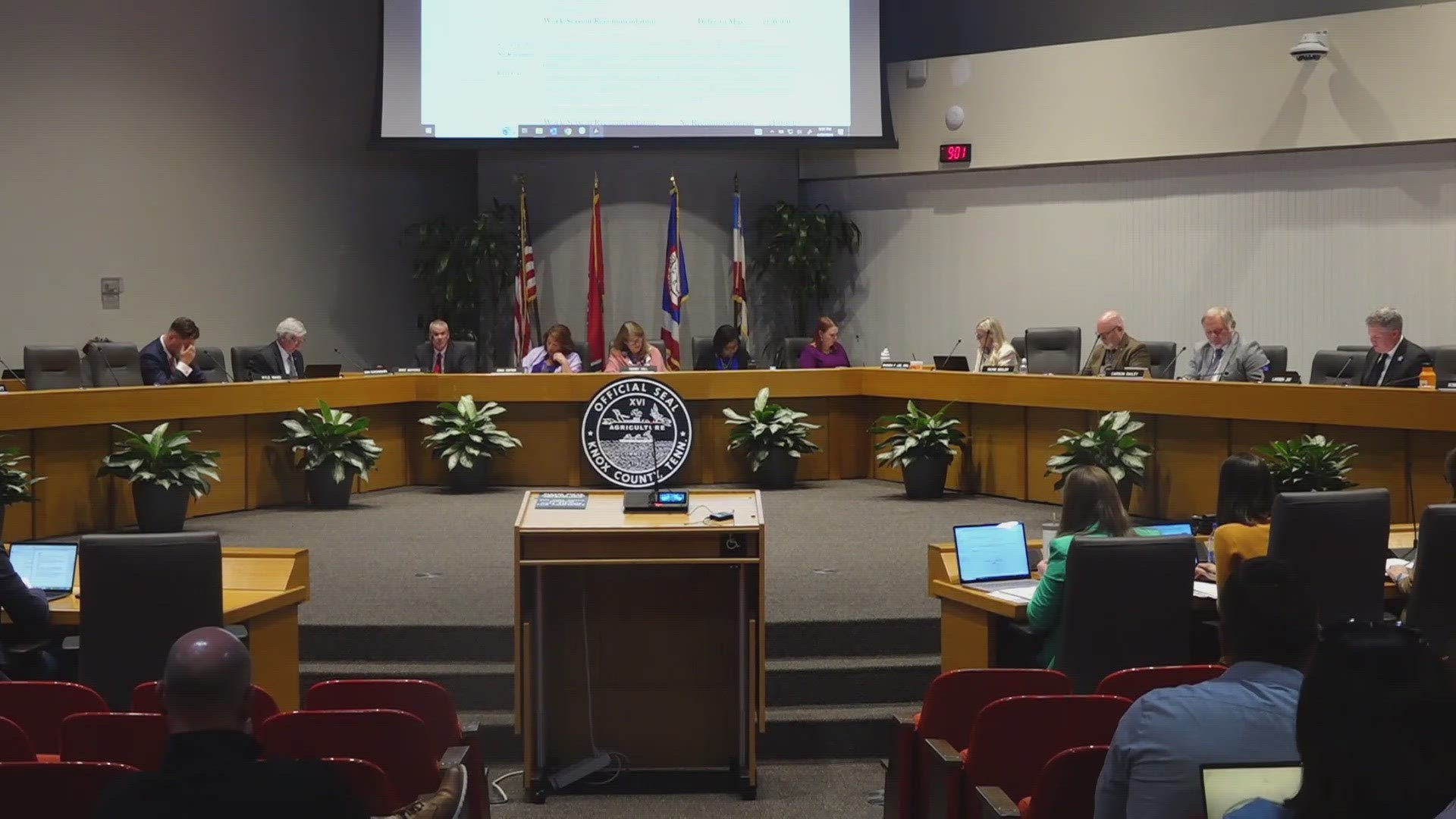KNOXVILLE, Tenn. — UPDATE (10:15 p.m.): The Knox County Commission cleared the way to implement a guide governing land use decisions for decades to come. The Comprehensive Land Use and Transportation Plan passed on Monday with a few minor amendments that leaders said do not need to go back to the Planning Commission, and would not upset Knox County Mayor Glenn Jacobs.
In passing the plan, the commission effectively took the final step of the Advance Knox initiative.
The plan mostly encourages the creation of relatively small commercial corridors in already-populated areas, such as in downtown Powell, Halls and along Rutledge Pike outside of Knoxville's city limits. Most of the area around Knoxville and Farragut would be labeled as either suburban areas, mostly including single-family homes in walkable neighborhoods, or as rural conservation areas.
Debate among leaders has mostly centered on the boundaries between Knox County and its municipalities — Farragut and Knoxville. Disagreements focused on whether certain areas in East Knox County and below Farragut should be exclusively zoned agriculture or whether they should offer developers more options to create higher-density neighborhoods.
On Monday, dozens of amendments were proposed and the commission went through each one, considering their implications and referring to Planning Commission to staff to see if they approved or disapproved. The commission adopted some future land use maps that do not change current specific zonings but does designate some portions from "rural conservation" to "rural living," allowing slightly more development in the area. Other small, rural parts were changed from suburban designations to "rural conservation" areas.
Some were withdrawn, some were approved and some were voted down. The broad strokes of the plan stayed the same, and the plan is expected to take effect in the next few weeks.
---
In November 2021, leaders in Knox County began work on a growth plan with the goal of creating a specific guide governing land use decisions for decades to come — hoping to avoid sprawl and offer new checks on development. Around two-and-a-half years later, the commission is on the verge of formally adopting a plan coordinated by Knox County Mayor Glenn Jacobs.
The Advance Knox initiative led to the creation of the Comprehensive Land Use and Transportation Plan. It comes as the result of an online survey offered to the Knox County community, as well as three rounds of in-person public input that includes workshops and focus group meetings.
It encourages the creation of relatively small commercial corridors in already-populated areas, such as in downtown Powell, Halls and along Rutledge Pike outside of Knoxville's city limits. Most of the area around Knoxville and Farragut would be labeled as either suburban areas, mostly including single-family homes in walkable neighborhoods, or as rural conservation areas.
Debate among leaders has mostly centered on the boundaries between Knox County and its municipalities — Farragut and Knoxville. Disagreements focused on whether certain areas in East Knox County and below Farragut should be exclusively zoned agriculture or whether they should offer developers more options to create higher-density neighborhoods.
Knox County Commission has already voted to approve the Growth Policy Plan, contingent on successful votes on the more granular Comprehensive Land Use and Transportation plans. Commissioners will vote on the Comprehensive Land Use and Transportation plans on Monday night.
Last week, Commissioners debated the land use and transportation plans. At-Large Commissioner Kim Frazier proposed several amendments to the plan, which she said her constituents requested.
Frazier said her constituents wanted it to have "more teeth."
She suggested more than a dozen changes she wanted to see made to the plan, suggesting granular changes focused on considerations of different types of spoil, conservation, historic resources and cost estimates.
Knox County Mayor Glenn Jacobs, in a letter to commissioners, called the changes "unacceptable" and urged the Knox County Commission to pass the plan as-is. The East Tennessee Realtors group, an organization of realtors, also called for leaders to pass the plan as-is.
Debate among leaders has mostly centered on the boundaries between Knox County and its municipalities — Farragut and Knoxville. Some debate was focused on whether areas in East Knox County and below Farragut should be exclusively used for agriculture, or whether developers could build on areas where infrastructure is already in place.
While Knoxville City Council easily passed the broader growth policy plan, Farragut leaders almost torpedoed it by voting against its passing. Before the plan can be adopted, Knox County Commission, Knoxville City Council and Farragut's Board of Mayor and Aldermen must all agree to it.
The April 22 vote could formally adopt the plan, or it may be tanked. If it is not approved, Knox County leaders may need to start over and develop a new land use plan — around two-and-half-years after work on the current version began.
If passed, the growth plan would guide decisions on land use for around 20 years. Knox County Commission will meet on Monday at 5 p.m.

